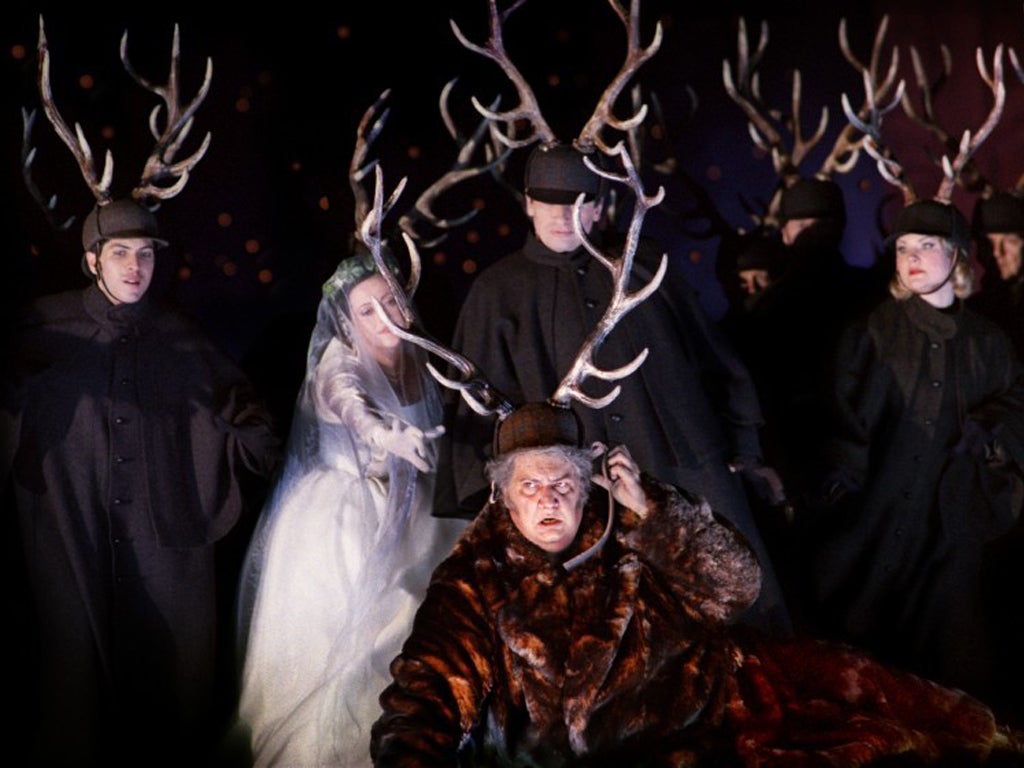Falstaff, Royal Opera House, London The Sixteen, Old Royal Naval College Chapel, Greenwich
It ain't over till the fat man sings ... and eats up all those roast chickens

Untroubled by heartburn or hangover, happy as a honeymooner in his wine-stained bedsheets, Verdi's last great operatic hero smiles serenely over a dozen grease-spattered room-service trolleys. Of the many types of love celebrated in Falstaff – from the nudging camaraderie of rogues to the fluttering cadences of female friendship, the vertigo of first love and the sturdy affection of marriage – none is as pass-ionate or as nuanced as that of Sir John for his stomach. Raconteur, philosopher and adventurer, he is a man made misty-eyed by the memory of a single salted anchovy.
What woman could hope to compete with an anchovy, six chickens, three turkeys and two pheasants? Food is everywhere in Robert Carsen's Royal Opera House production, which propels us into the greedy 1950s. Rationing has ended and new money has arrived in Windsor, eager to adopt old-money traditions. Downstairs from Falstaff's befouled bedroom, in the oak-panelled dining room of The Garter Inn, the dessert trolley groans under croquembouche and charlottes russes. Women sip Martinis while the gentlemen smoke behind their newspapers, and time stops as Nanetta (Amanda Forsythe) steals a kiss from Fenton (Joel Prieto). As the diners freeze, the chandeliers in Paul Steinberg's set are lowered and the stuffy yellow glow of electricity becomes the cool blue of moonlight.
Carsen is good on physical detail: the contrapuntal snap of handbag and powder compact as the merry wives conspire, the compulsive pilfering of cigarette boxes, tea towels, even underwear, by Alasdair Elliott's pink-nosed Bardolph and Lukas Jakobski's lumbering Pistol. There are some surprising touches: a hint of comfort- eating from Amanda Forsythe's Nanetta and a sexy comic turn from Marie-Nicole Lemieux's Mistress Quickly as a woman whose unfashionable curves promise unimaginable pleasures for the connoisseur. For a moment, I thought Ambrogio Maestri's insatiable Falstaff had met his match.
If Lemieux steals that scene, Rupert, a placid Irish draught horse, steals the Act III monologue, munching hay while Falstaff sings his paean to the restorative powers of hot wine. Hold on to the memory of the hat stand in the smoking room, for it's as close to the Herne Oak as you'll get. This production's concern is too much with the veneer of society and too little with fantasy. Moreover, where Richard Jones's Falstaff evoked the mores of late 1940s Britain, this production has a transatlantic twang. Alice's enormous fitted kitchen speaks of a wealth beyond the British middle class, while her prim, jealous husband (Dalibor Jenis) adopts the look-at-me costume of a Texan oil man for his honeytrap plot. If the point being made is that we are all in disguise – in hunting pink, tweed plus-fours, Stetson or Norman Hartnell gown – Verdi makes it more subtly in the closing fugue, which Carsen stages as a catwalk parade on a banqueting table.
Musically, standards are high. How could they not be with a score like this? The voices are well-blended, idiomatic, the diction crisp, the co-ordination between pit and stage occasionally fraught, occasionally brilliant. Falstaff himself is a miracle, now sweet, now salty, the most revealing lines of the libretto almost tossed into the air. Conductor Daniele Gatti conjures a scintillating performance from the orchestra, scissored with sforzandi from the strings, bathed in a sensual glow the staging cannot reproduce.
The strapline for The Sixteen's Choral Pilgrimage ("Inspiring music in glorious buildings") gives little impression of the intensity and ambition of Harry Christophers' programme of Flemish polyphony. Josquin's motet Praeter rerum seriem opens a door to a world view as fervent as that of an apocalyptic cult. This is polyphony at its most dangerous, the bitter black silt of the lower voices in motion, the high tenors and husky low sopranos proclaiming a mystery. The background is one of immense power, of bishops and princes, plague and earthquake, the last vividly painted in two movements from Brumel's 12-part Missa Et ecce terrae motus and in the madrigalian effects of Lassus's Timor et tremor.
'Falstaff' (020-7304 4000) to 30 May. 'Choral Pilgrimage' (01904 651485): St Edmundsbury Cathedral, Bury St Edmunds, tomorrow, then touring
Critic's choice
English National Opera's production of Detlev Glanert's adaptation of Camus' Caligula opens (Fri) at the Coliseum, London, with Peter Coleman-Wright, above, as the depraved emperor. François-Xavier Roth conducts Daniel Hope and the BBC National Orchestra of Wales in Shostakovich's Violin Concerto No1 at St David's Hall, Cardiff (Fri) and Brangwyn Hall, Swansea (Sat).
Subscribe to Independent Premium to bookmark this article
Want to bookmark your favourite articles and stories to read or reference later? Start your Independent Premium subscription today.

Join our commenting forum
Join thought-provoking conversations, follow other Independent readers and see their replies